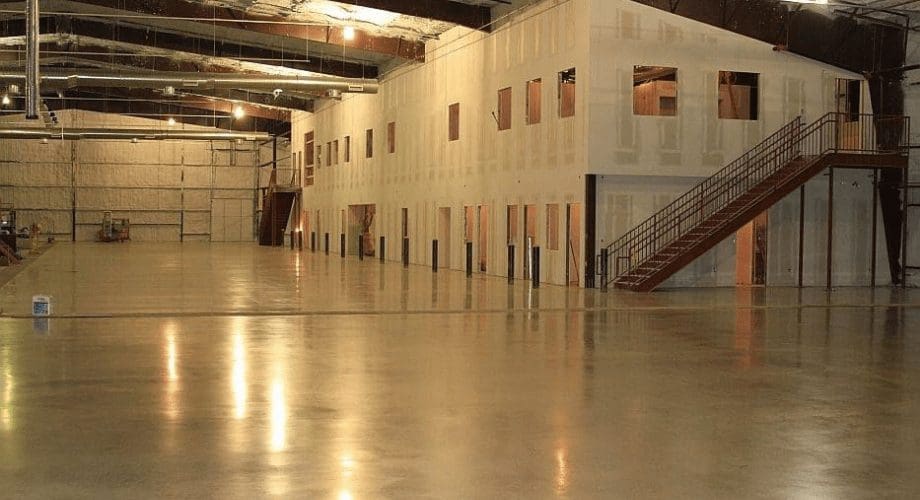Warehouse Flooring Options for Your Commercial Space
Service: Epoxy Floor, Joint Filling, Polished Concrete
If you’re making a decision on warehouse flooring options for your commercial space, there are many factors to consider, including choosing an experienced contractor and taking into account how to best minimize downtime, come in on budget, and create a uniform surface that is long-lasting. Furthermore, each facility comes with specific requirements, based on how the area will be used.
While some factors vary from business to business, nearly all commercial spaces require flooring that can withstand high-impact use and highly variable temperatures, and most property managers, contractors, and business owners prefer low maintenance and cost—while not wanting to compromise the style of the space. When comparing warehouse flooring options, epoxy flooring and polished concrete are two clear front runners.
Both of these flooring types have nearly endless options when it comes to color, sheen, and functionality. Both polished and epoxy flooring are extremely durable, environmentally friendly, and cost-effective options for large spaces, like warehouses. In the end, the decision between epoxy and polished floors usually comes down to what the space will be used for and the budget that has been allocated for the project.
Simply put, epoxy flooring will be a more durable option and is used frequently in heavy traffic areas. However, it is more expensive than polished concrete. On the other hand, polished concrete cannot withstand as much traffic as epoxy flooring but can still handle the weight of a forklift and other heavy machinery.
Understanding more of the benefits of both types of flooring will help you make the right choice for the particular needs of your project. The first step in delivering the desired look and functionality of your space is choosing the correct contractor.
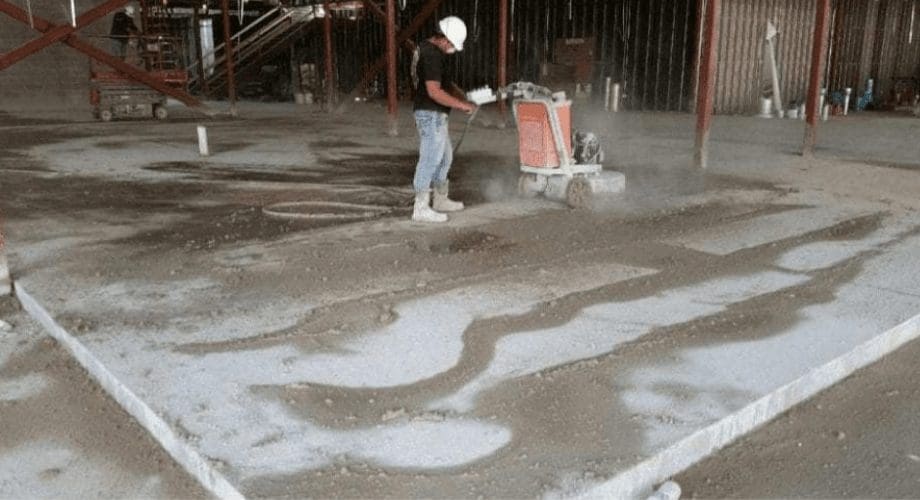

Concrete Floor Polishing Contractors: Choosing One That’s Right For You
It is important to locate a reputable concrete floor polishing contractor who can assess your needs, work with you on design considerations, and provide you with time and budget estimates for the work. This may be the most important step in the process, as hiring a professional who can do the job correctly can affect how safe (or unsafe) your warehouse is for employees, forklifts, and other heavy machinery.
Just as with any industry, there is a wide spectrum of experience and professionalism among concrete floor polishing contractors. Depending on the size of the space, installing flooring in a warehouse can be a major undertaking, and creating a slip-resistant, uniform surface that will stand the test of time should not be a decision taken lightly. Whether you already have strong ideas about the type of flooring that would work best in your commercial space or you need inspiration and guidance from a professional, it is of utmost importance to choose a reputable contractor with the expertise as well as the technical skills required to help you achieve the look, feel and level of functionality you need.
When assessing concrete floor polishing contractors, consider these factors:
- What is their track record—how long have they been in business, and what types of similar jobs have they handled in the past?
- What types of equipment and materials do they use?
- Do they offer environmentally friendly flooring methods?
- What, if any, trade certifications do they hold?
- How do they handle individual design preferences? Can they work with your ideas or help you develop them to create a truly beautiful concrete floor that meets all the requirements of your space?
This is a basic list of factors to consider when you’re looking for a concrete floor polishing contractor for your project. Don’t be afraid to ask plenty of questions and request portfolios of prior work so you can get a solid feel for the company you are considering to handle the job.
Once you’ve retained a reputable, reliable, and professional contractor, it’s time to move forward with the decision of which type of commercial concrete flooring best fits your space.
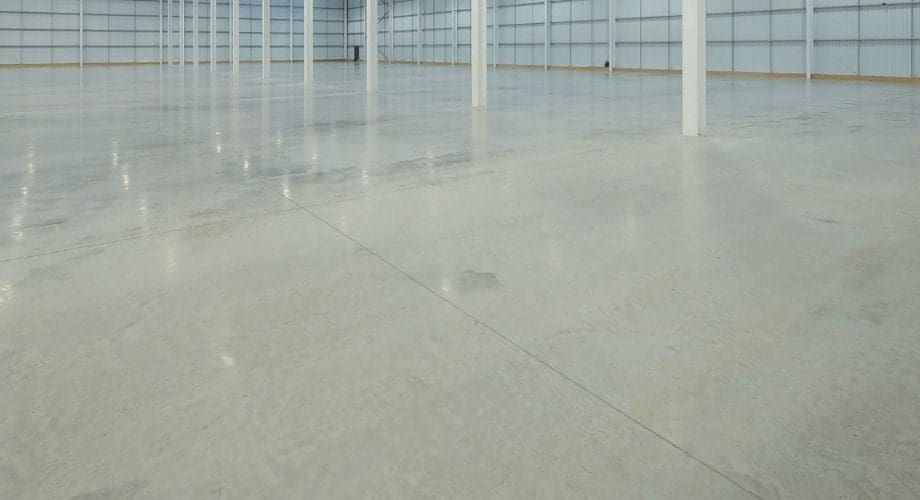

Commercial Concrete Flooring: What are the Options?
Deciding between polished vs. epoxy flooring can be difficult. There are many benefits that come with both types of flooring—you’ll notice warehouses often have either of these kinds of surfaces and sometimes both, in different areas because they require minimal maintenance and cleaning.
While most warehouses have polished concrete with a natural gray color, you have the option of adding either acid-based or water-based stains to further customize your space or just limited, more customer-facing areas. Acid stains give you rich, earthy tones, including browns, blacks, greens, blues, and grays. Water-based stains have a much broader color spectrum, including reds, yellows, and even whites.
In addition to customizing your colors, you might choose to add visual interest to your concrete flooring with decorative saw cuts or aggregates embedded in the concrete. Aggregates may include granite, quartz, or recycled glass that create a look very similar to terrazzo tile when the concrete is cured and sealed. You could also choose to have your business logo incorporated into the flooring design with stain, saw cuts, or other features.
With both types of flooring, it is critical that you hire a professional who can handle the scope of your project. If the concrete grinding, preparation, and sealing are not performed correctly, your surface could see premature chips and cracks, which is a safety hazard for employees and can add to maintenance costs and time.
The differences between these two types of commercial flooring are their durability, cost, and maintenance requirements.
Epoxy Concrete Warehouse Flooring
While both flooring options are durable, epoxy can be engineered to be the stronger of the two. Industrial coatings are highly customizable to that protect the integrity of the concrete under any type of pressure, including that of heavy machinery. Epoxy is a great option if your warehouse is used for the distribution of pharmaceutical products, food and beverage storage, chemical storage, and other processing and manufacturing options due to its ability to withstand nearly any type of demand—no matter how extreme.
One of the downsides of an epoxy concrete coating is that while durable, it is more expensive. However, keep in mind epoxy flooring might be a better investment if your warehouse must withstand heavy-duty conditions. In addition, the service life of an epoxy coating under high demands may be shorter than a polished concrete floor. You may choose a hybrid approach, with epoxy coatings in some parts of your warehouse and polished concrete in others.
Installation starts by removing all existing concrete coatings, dirt, and other contaminants and then filling in any control or expansion joints. Every project is different, so depending on your warehouse’s needs, there may be a resinous cove base or a primer applied to your concrete before applying the base coat. After the base coat, the stain is applied to achieve your exact desired color. To finish, a top coat will usually be added.
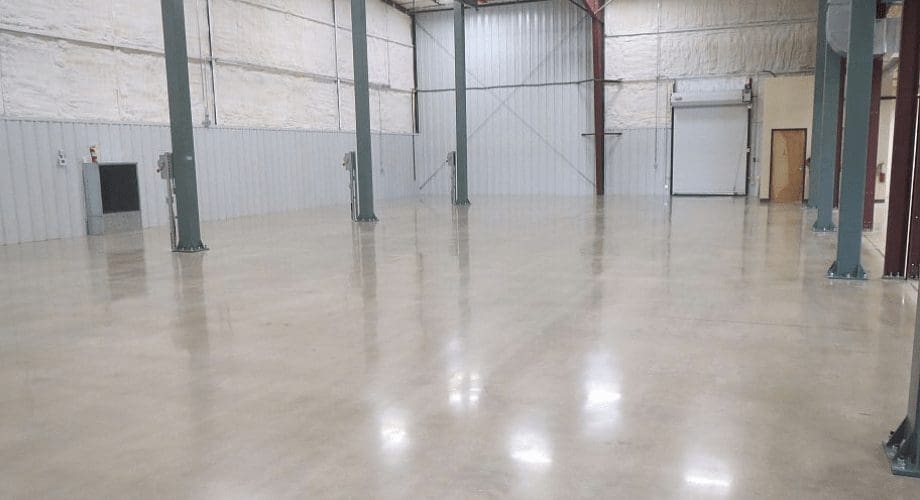

Polished Concrete Warehouse Flooring
Polished concrete flooring will generally be a more affordable option than an epoxy or industrial coating. Although a polished concrete surface can withstand the weight of a forklift, it cannot hold up against as much wear and tear as epoxy. This flooring is a great option for a light to medium general service warehouse that isn’t being used 24 hours a day.
There are many factors that go into creating high-quality results with polished concrete warehouse flooring, including using the right equipment to create the desired look, durability, and level of gloss. The basic process of polishing concrete can be compared to sanding wood. The “sandpaper” used in polishing concrete is progressively fine diamond-grit abrasives that are attached to high-performance machines that grind the surface of the concrete to achieve a smooth, polished surface.
Depending on the level of fineness of the diamond grit that is used, varying levels of gloss can be achieved. The gloss and reflectivity of the flooring are measured on a scale from one to four. A level one will look flat and hazy with very little reflection. On the other hand, a level four will be highly polished and if you look down you will be able to see your reflection in the flooring. One of the benefits of polished concrete is its reflectivity since these surfaces tend to need less lighting, which can cut down on utility costs.
There are both wet and dry polishing methods, but dry polishing is most common in large commercial spaces since it is both faster and safer for the environment. Wet polishing uses water to keep the diamond grit cool and preserve it for extended use, but this method creates a lot of slurry–a mixture of water and fine cement particles–that must be contained and disposed of in accordance with legal as well as environmental guidelines. The dry polishing method still creates a lot of dust, but it is easily collected and disposed of.
When polished concrete warehouse flooring is done correctly, with internal sealers applied to the concrete prior to polishing, top-coat sealants, and subsequent waxing are extraneous. The internal sealant hardens the concrete, protecting it by making it denser from within. When the final polishing process is applied, the resulting high-gloss concrete never needs to be waxed, sealed, or otherwise coated, and the floor is both beautiful and durable, as well as very easy to maintain over time.
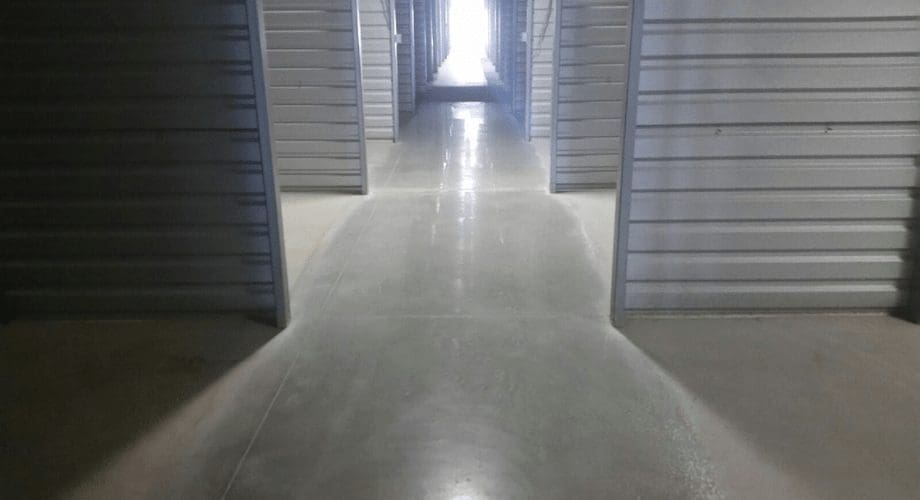

Concrete Joint Filling: What is It and Do Your Floors Need It?
If your commercial space has poured concrete flooring, it may naturally develop cracks over time. Fluctuations in temperature, humidity, and other factors contribute to the development of cracks, and the simple truth is that cracks in any expanse of concrete are normal and common.
If you’re working in a warehouse with a pre-existing concrete floor that has developed irregular cracks or cracks between poured slabs, it is essential to use concrete joint filling before the surface of the concrete is refinished for safety purposes. Concrete joint fillings will greatly reduce the chance of your concrete chipping over time, therefore extending the life and durability of your concrete and eliminating any potential tripping hazards. The best joint filling options will be epoxy or polyurea fillers that are slightly flexible, so they can continue expanding and contracting with the surrounding concrete even after application and polishing.
Concrete joint filling can also be applied after stains, sealers, and epoxy coatings have already been applied. In this case, self-leveling polyurethane joint fillers are good choices, since they are less likely to shrink as they cure. Your concrete flooring contractor can work with you to determine the best concrete joint filler to use for your floor’s particular conditions and needs.
AllStar Can Help With Your Warehouse Flooring Project
Concrete flooring is our specialty at AllStar Concrete Coatings, and we pride ourselves on delivering top-quality results for our clients, every time. Our depth of industry knowledge and specialized, high-end equipment enable us to meet every client’s unique needs and provide a high level of satisfaction. We are experienced in commercial projects of all sizes, with a deep understanding of how to meet the demands of warehouse spaces. With AllStar’s help, you can rest easy knowing that your warehouse will be able to withstand the unique demands of your space.
Ready to learn more about how AllStar can help you? Take advantage of our free consultation to get the ball rolling.Free Consultation

